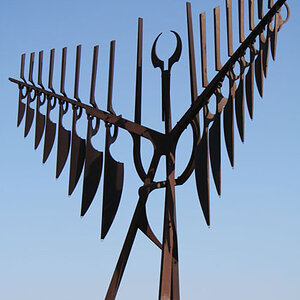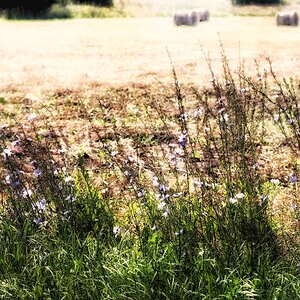- Joined
- Dec 11, 2006
- Messages
- 18,743
- Reaction score
- 8,047
- Location
- Mid-Atlantic US
- Website
- www.lewlortonphoto.com
- Can others edit my Photos
- Photos NOT OK to edit
In Myanmar, Buddhist males are supposed to spend at least two three month periods in a monastery, the first when they are young and the second when they have finished their working life and have settled their responsibilities to their families.
Although monks are usually supposed to depend on the kindness of others to provide food for them and thus seeing monks going out with their bowls to beg for food is a common sight in early morning (see second picture below), that isn't plausible near this quite large monastery which is in a semi-rural area so the monks are fed by the monastery twice a day in a large eating area.

Providing food for monks is a way of 'gaining merit'; an interesting excerpt explaining the concept of 'merit' from The Berzin Archives is quoted below the picture

If this quote piques your interest, you might read the rest of the discussion on merit and 'positive potential' at The Buddhist Concept of Merit: Does Happiness Need To Be Earned?
This is sort of similar to the Hebrew concept of the 'mizvah' to give charity; give, not because doing so ill earn you anything, but because it is fulfilling G-d's Wish. He made the world and left it to humans to fill it with meaning and spirituality.
Although monks are usually supposed to depend on the kindness of others to provide food for them and thus seeing monks going out with their bowls to beg for food is a common sight in early morning (see second picture below), that isn't plausible near this quite large monastery which is in a semi-rural area so the monks are fed by the monastery twice a day in a large eating area.

Providing food for monks is a way of 'gaining merit'; an interesting excerpt explaining the concept of 'merit' from The Berzin Archives is quoted below the picture

The word merit in English is completely the wrong word. This word seems to imply that you score points for doing good things, and if you get enough points lets say 100 points then you win a medal. This is a childish idea, something like the scouts merit badge, and is certainly not what we mean by merit in Buddhism. The German word Verdienst is actually much more interesting and not as childish. I think we need to focus on this meaning, rather than on the English word.
I prefer to translate the concept from Sanskrit or Tibetan as positive potentials or positive force, because this is something that arises as a result of acting constructively and which then ripens into happiness. Of course, we will look into the meaning of this a little more deeply, because there are three terms here that are quite technical and specific. What do we mean by acting constructively? What do we mean by happiness? What is this process of ripening? What is the relationship between acting constructively and being happy? For example, I might try to do some nice things, but I might not be very happy as a result, so what is going on here?
First, I think we need to examine the idea of Verdienst. What does verdienen mean? Does verdienen mean happiness? Or does it mean to earn happiness, or to deserve happiness? To earn means that you work at a job and then you are paid, so you have earned something. Similarly, we work at being good and then we earn our happiness. Is that what this is about? Or does it mean that we deserve happiness? I have a right to be happy. I paid my money and now I have the right to get a good product. If I dont get that good product, Ive been cheated. All these ideas get mixed up with the German word verdienen. Actually, as I said earlier, it is not as childish as the idea of merit in the sense of getting points and winning a contest, because in fact these are really very serious matters.
If this quote piques your interest, you might read the rest of the discussion on merit and 'positive potential' at The Buddhist Concept of Merit: Does Happiness Need To Be Earned?
This is sort of similar to the Hebrew concept of the 'mizvah' to give charity; give, not because doing so ill earn you anything, but because it is fulfilling G-d's Wish. He made the world and left it to humans to fill it with meaning and spirituality.







![[No title]](/data/xfmg/thumbnail/32/32151-8f2e9547814c70d611d42980b03d275d.jpg?1619735233)


![[No title]](/data/xfmg/thumbnail/32/32156-d6cfe2865ceed861a0633752a006ea20.jpg?1619735234)


![[No title]](/data/xfmg/thumbnail/37/37413-e579e9da185db973d8cb34300b9f0eb9.jpg?1619738059)
